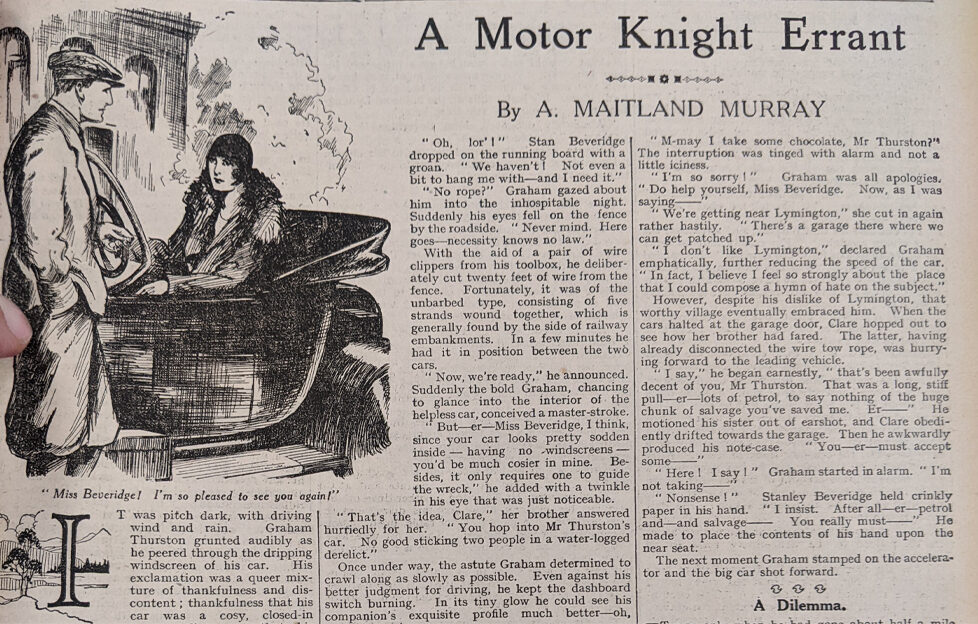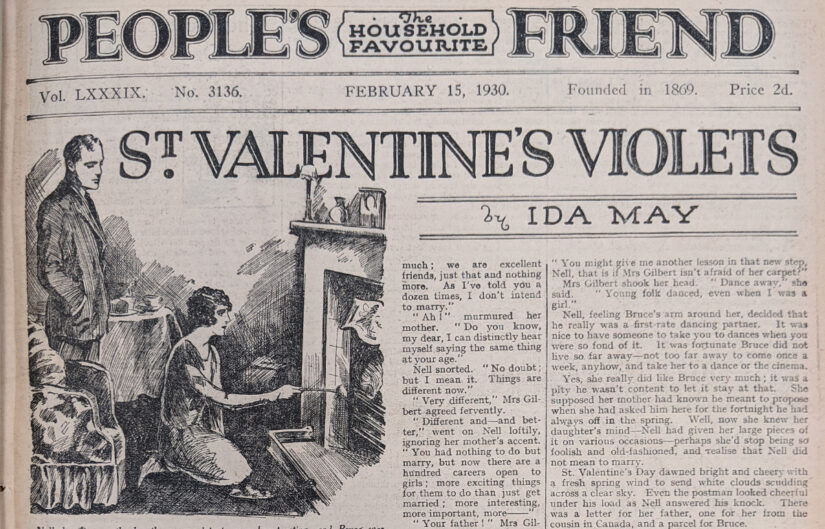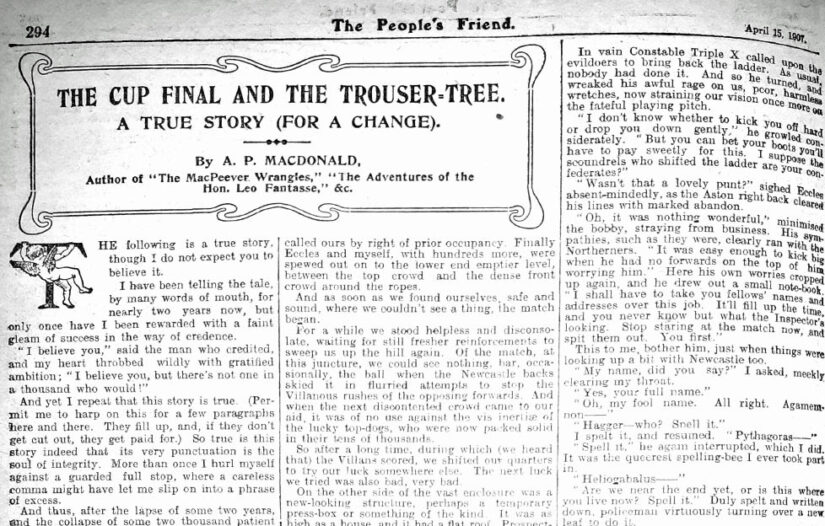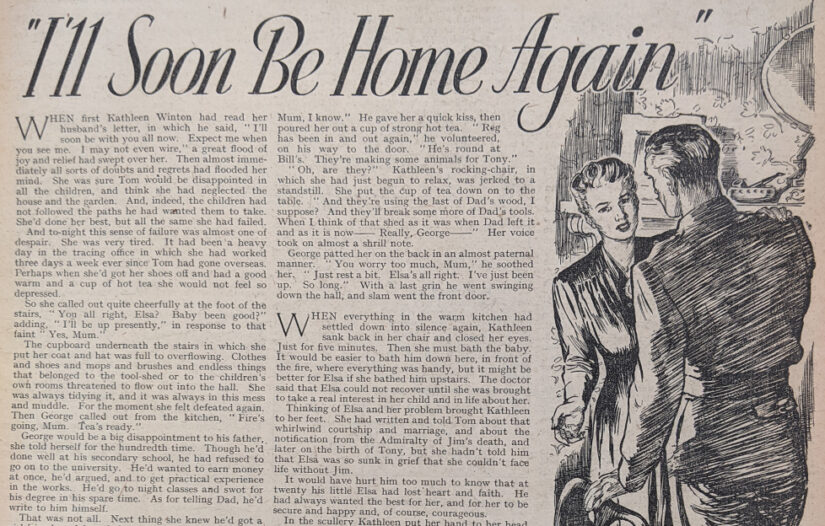
“A Motor Knight Errant” by A. Maitland Murray, first published on January 11, 1930 is the fifth episode of Reading Between The Lines season 3. The team had fun with this episode, turning RBTL into more of a true crime podcast! Our romantic lead reads more like a serial killer . . . Listen along to the episode as you read, and let us know what you think!
It was pitch dark, and driving wind and rain. Graham Thurston grunted audibly as he peered through the dripping windscreen of his car. His exclamation was a queer mixture of thankfulness and discontent; thankfulness that his car was a cosy, closed-in couple; discontent that his six months’ leave from Africa was fast drawing to a close.
“And not a confounded thing happened the whole time,” he growled aloud. “Toured about the whole country and not even the excitement of—of running over a blessed hen! Nothing ever happens in this bleak hemisphere—except this!” he finished savagely, as a violent gust of wind spattered the windows.
Suddenly, out of the darkness ahead, gleamed what appeared to be the red tail-light of a car. Realising that he was fast overtaking it, he slowed down. The next moment a figure stepped full in the glare of his headlights, waving arresting arms.
“Good evening. Anything wrong?” Graham had now drawn up opposite what proved to be a stationery car.
“The whole world!” A young fellow with a begrimed but laughing face came forward. “My chariot simply refuses to budge. And she’s chosen a fine night for it, hasn’t she?” he finished with a sarcastic look at the offending vehicle.
“I wonder if I could—” Graham hopped out and almost collided with a girl who had suddenly come out of the darkness into the zone of light.
“That’s awfully good of you,” went on the strange young man gratefully. “But I’m afraid—oh, this is my sister, Clare. Name’s Beveridge. I’m Stanley. Although there’s little of the ‘On, Stanley, on’ tonight about me!”
“My name’s Thurston—Graham Thurston.” Graham acknowledged the informal introduction, his eyes rudely glued to what he considered the prettiest girl he had ever had the luck to clap eyes upon. As she stood there in a glistening green leather coat, dark eyes flashing in seeming defiance of the wind and rain that whipped her rosy cheeks, she literally ran riot over his heart and brain. It was only when he saw her eyes flicker in some slight confusion that he tore his gaze away.
“Now, let’s see.” He strode over to the car.
However, at the end of fifteen minutes, he realised that it was hopeless. He straightened up, wiping his hands.
“Nothing for it but to tow you,” he decided. “Have you a rope?”
“Oh, lor’!” Stan Beveridge dropped on the running board with a groan. “We haven’t! Not even a bit to hang me with—and I need it.”
“No rope?” Graham gazed about him in to the inhospitable night. Suddenly his eyes fell on the fence by the roadside. “Nevermind. Here goes—necessity knows no law.”
With the air of a pair of wire clippers from his toolbox, he deliberately cut twenty feet of wire from the fence. Fortunately, it was of the un-barbed type, consisting of five strands wound together, which is generally found by the side of rail embankments. In a few minutes he had it in position between the two cars.
“Now, we’re ready,” he announced. Suddenly the bold Graham, chancing a glance into the interior of the helpless car, conceived a master-stroke.
“But—er—Miss Beveridge, I think, since your car looks pretty sodden inside—having no windscreens—you’d be much cosier in mine. Besides, it only requires one to guide the wreck,” he added with a twinkle in his eye that was just noticeable.
“That’s the idea, Clare,” her brother answered hurriedly for her. “You hop into Mr Thurston’s car. No good sticking two people in a water-logged derelict.”
Once under way, the astute Graham determined to crawl along as slowly as possible. Even against his better judgement for driving, he kept the dashboard switch burning. In its tiny glow he could see his companions exquisite profile much better—oh, much better!
“By the way, Miss Beveridge,” he began brightly, “if you’re hungry and cold, there’s everything in this cosy little ship to alleviate your distress. Cigarettes—if you smoke—in the rack above you; chocolate in that box, and hot coffee in a thermos under the seat.”
“Really, Mr Thurston, you—” His companion broke in a rippling laugh that cascaded over Graham’s heart like a silvery stream over parched and thirsting ground. “One would almost think you came prepared to rescue someone.”
“Oh, absolutely! I did,” agreed Graham airily. “You see, I’m running around doing nothing at the moment. It’s a sort of hobby of mine.”
“What is?” queried the other innocently. “Doing nothing?”
“No. Rescuing Beauty in Distress,” he replied boldly. “And I must say on this occasion I have exceeded—”
“I—I hope we aren’t hindering you too much,” she interrupted hastily, and, with the tail of an ever-watchful eye, Graham saw the colour rush to her face, to make her a thousand times prettier, he decided emphatically.
“Hindering me!” he echoed. “I’d loiter about in a tornado if I thought—well, I won’t tell you what I think,” he completed. “But about this hobby of mine. You’re really my first case, you know.”
“Oh!” It was a distinct little gasp. “But I thought a hobby was a thing extending over years?”
“Quite,” agreed Graham. “But one must make a beginning some time. And now, having reached the height of success in my hobby—the supreme triumph—I seriously consider—”
“Are you not getting a bit mixed, Mr Thurston?” she smiled. “How, since you have just started, can you have attained the height of success in your hobby?”
“Easy!” Graham blandly waved his hand above the wheel. “One comes along in a dark night and sees a broken-down car. Beside it, the prettiest girl on earth—remember, the hobbyist is the sole judge of his hobby—with, say, charming dark eyes, dressed possibly in a dripping, green leather coat, and—”
“M-may I take some chocolate, Mr Thurston?” The interruption was tinged with alarm and not a little iciness.
“I’m so sorry!” Graham was all apologies, “Do help yourself, Miss Beveridge. Now, as I was saying—”
“We’re getting near Lymington,” she cut in again rather hastily. “There’s a garage there where we can get patched up.”
“I don’t like Lymington,” declared Graham emphatically, further reducing the speed of the car. “In fact, I believe I feel so strongly about the place that I could compose a hymn of hate on the subject.”
However, despite his dislike of Lymington, that worthy village eventually embraced him. When the cars halted at the garage door, Clare hopped out to see how her brother had fared. The latter, having already disconnected the wire tow rope, was hurrying forward to the leading vehicle.
“I say,” he began earnestly, “that’s been awfully decent of you, Mr Thurston. That was a long, stiff pull—er—lots of petrol, to say nothing of the huge chunk of salvage you’ve saved me. Er—” He motioned his sister out of earshot, and Clare obediently drifted towards the garage. Then he awkwardly produced his note-case. “You—er—must accept some—”
“Here! I say!” Graham started in alarm. “I’m not taking—”
“Nonsense!” Stanley Beveridge held crinkly paper in his hand. “I insist. After all—petrol and—and salvage— You really must—” He made to place the contents of his hand upon the near seat.
The next moment Graham stamped on the accelerator and the big car shot forward.
It was only when he had gone half a mile along the road that Graham realised to the full what he had done.
“Lor’, but I’m a priceless idiot!” he groaned aloud. “But it was that idiotic brother of hers, with his confounded—”
Ever ready to help rich or pool, the beautiful or plain, Graham yet had a mortal dread of being recompense in any way for his chivalry. And when gratitude took the form of an offer of money, he simply fled, as he had done tonight.
“And I can’t even remember their car number,” he muttered. “I know nothing but her name. I don’t know where she was going, and I never found out where she lived. Once they get that car fixed, she may go anywhere. And where am I to . . . and I can’t go back now. Not with that maniac of a brother. Oh, you glorious twelve stone’s worth of mumbling idiot!” he finished in vicious self-condemnation.
Graham was exceedingly angry. Even his generally irrepressible nature was utterly swamped by the idea that he might never see Clare Beveridge again. And it looked ominously like it. He was nearing the end of his tour, gradually working his way south, making arrangements for accommodation from day to day by wire. Tonight—Friday—he was due at the county town of Cromley Manor, where he had booked a room at the County Hotel. On the morrow he moved on again, and it was fantastic to hope that he would ever come across her on the road again.
With a dismal groan he sank lower in his seat, then, with an effort to do something which would occupy his whole attention, he made the powerful car rock and sing on its last twelve miles to Cromley Manor.
The following morning, after a very restless night of dreaming in which he had frantically pursued a car containing Clare Beveridge over a maze of roadways, he strolled into the hotel garage with the intention of getting his car ready to resume his journey. He was barely inside when a policeman accosted him.
“N.H. 5227—that is your car, sir?” began the officer formally. “You are Mr Graham Thurston? Yes? Well, the garage proprietor admits he found this coiled up on your luggage grid last night.”
He held up the wire tow rope of the previous evening and Graham’s heart sank.
“Er—yes, I—I suppose he would,” he murmured guiltily.
“Quite,” continued the other stolidly. “It was reported to us late last night that the railway fence seven miles cast of Lymington had been maliciously cut and a considerable portion of wire removed. Suspecting cars, we questioned surrounding garages, and the man at Lymington reported seeing your car passing through the village with a length of wire coiled on the luggage grid.”
“But, dash it all, I—I had to do something,” exclaimed Graham. “If you tell me what’s to pay, I’ll gladly—”
“I’m not here for that purpose, sir,” explained the officer civilly enough. “I’m merely here to serve you with a summons for wilful damage.” He handed over a blue form. “You can explain the circumstances to the magistrate at three o’clock this afternoon. Court is being held today, as there is a holiday on Monday.”
“Three o’clock!” burst out the exasperated Graham. “But I’m pushing off now; I can’t be bothered to wait until—”
“Afraid you’ll have to,” corrected the other stiffy, “or risk arrest—plus contempt of court.”
When the man in blue had taken his departure, Graham glowered moodily after him. He had heard about it, but never before had he seen it—the famous straw that broke the camel’s back! But this was it with a vengeance! Not that he cared a row of pins about the court—that would only be a paltry fine—but the crushing irony of it all! After losing touch with the only girl he had ever given a second thought to on account of his desire to escape reward for his action, he had now found himself being persecuted at law for that same action! As if it wasn’t enough to—
Graham stumped into the courthouse that afternoon determined to be deliberately rude to all concerned!
“I find the charge proven.” It was half an hour later, and a big, broad-shouldered, grey-haired magistrate regarded him sternly. “The circumstances, I admit, lessen to a great extent the gravity of your offence, nevertheless, if such practice became fashionable— You will be fined ten shillings, with ten shillings expenses.”
Ten minutes later Graham descended the steps of the gloomy building, his spirits in very low water indeed. N the point of stopping off the pavement some fifty yards further along, the sharp scream of a motor-klaxon halted him one foot in the gutter. He spun round and his yes almost popped out of his head—and his heart out of its place.
“Mr Thurston! This is a surprise!” It was Clare Beveridge who hailed him.
“Miss Beveridge!” Graham literally leapt to the side of her car. “I’m—I’m so pleased to see you again!”
“Is that quite true, Mr Thurston?” she parried, dark eyes flashing mischievously up into his face.
“You seemed in rather a hurry to get away from me—from us last night, anyhow.”
“I—I’m awfully sorry if I appeared rude,” stammered Graham, face scarlet. “But—well, I mean I simply had to—”
“To dash off in a hurry?” she supposed demurely. “Of course we must have hindered you quite a lot, so I’ll forgive you. By the way, I saw you coming out of the courthouse. What on earth were you doing there?”
“Well, I—” Graham laughed awkwardly. “It’s so—so amusing. I came along to have a look at some periodicals and wandered in there, thinking it was the public library. Dashed funny, isn’t it?” And he laughed again, one eye watching apprehensively for the effect of his tale.
“Yes, the place does look rather like a library, with its stone pillars in front,” she conceded with a sympathetic laugh. “But Cromley Manor is a quaint old place in many ways. Are you—er—staying here, Mr Thurtson?”
It was a leading question and the wily Graham didn’t wish to commit himself in any way. He had once more found this bewitching, dark-eyed girl who had come to him out of the storm, and he wasn’t letting her out of his sight again—not if he had to cling onto the tail-light of her car. He decided—for the moment, anyhow—to evade a direct reply.
“Well, as a matter of fact,” he began, then stopped, his innocent expression plainly inviting further enlightenment on her question.
“Because if you are,” went on Clare, flopping unsuspectingly into the engineered gap, “I was just thinking I could repay you in some little way for your kindness. We do owe you a lot, you know. Will you come to dinner with us tonight? Crianford House. It’s just a mile up the hill from Lymington—a twenty minutes’ run from here.”
“Absolutely delighted, Miss Beveridge!” cried Graham. “Thanks so much.”
“Righto, then,” she smiled, letting in her clutch. “I’ll push off as I’ve some shopping to do. Seven-thirty, or thereby. Bye bye.”
Clare had said Crianford House was a twenty minute’s run from Cromley Manor, which meant that she neither knew Graham’s car, or the spirit which served the man behind the wheel. Graham Thurston’s whole being was centred on the object of that night—Clare, with the soft, shadowy eyes. Clare, the beautiful!
“Clare, Clare!” He murmured the words softly to himself, his voice crooningly pitched to the steady hum of perfect engines that were fast, wrecking all calculations of time and distance.
“Ah, here you are!” Clare herself, radiant in a deep flame-coloured dress of diaphanous tulle welcomed him at the door of Crianford House, a huge, red building, snuggling low to the warm earth in a thick pine wood literally throbbing with hidden life. “Well up to time. Come and meet mums and dad.”
Quickly she ushered him into the drawing-room, and there Graham’s legs almost crumpled underneath his tall, heavily-built figure. The grey-haired gentleman who came forward to meet him was the magistrate whom he had faced not six hours previously!
“Good evening, Mr Thurston,” beamed the other, enjoying his visitor’s blank expression with great good humour. “A more pleasant meeting, eh? Not so expensive for you, anyhow! This is my wife, and you’ve met Stan, of course. We’re not a very big party, and, as far as I can see, not very evenly paired, but you can take Clare in to dinner. Stan, you’re odd man out.” And with that, the bluff Mr Beveridge—an entirely different individual from the magistrate—led the way to the dining-room.
The dinner—as far as dinners go—was, Graham supposed, a huge success, but his mind was in far too big a swirl to appreciate it. In a dazed sort of way he heard and answered the conversation about him. Heard Mr Beveridge apologising profusely for fining him, pointing out that, while he knew full well from his name and number of his car that he was his son’s and daughter’s benefactor, he was compelled to do his duty when the police brought he matter up for him to deal with. Smart fellows, all the same, those county police, he opined, and he was sure Graham would agree with him. Graham did—with one eye on Clare and the other on the particular dish in front of him. He was desperate to get Clare alone. However, all things come to an end—even the most endless dinner.
“Perhaps you’d like to see the grounds, Mr Thurston?” suggested Mr Beveridge as they rose. “It’s a lovely moon, and they look rather charming in moonlight. Clare and Stan will take you round—if you excuse my staying in.”
“Why, certainly, Mr Beveridge,” assented Graham, and inwardly bestowed a fervent blessing on Mr Beveridge’s grey hairs. “It’s rather chilly outside tonight.”
Outside in the hall, with trembling hands, he assisted Clare into a cosy fur wrap, while the subtle perfume from her shadowy hair stirred in his nostrils like incense. Stanley, standing solemnly by, waited till the operation was complete, then drifted out with them on to the low-flagged terrace. Once clear of the house, Graham felt he had better command of the situation.
“Er—Stanley,” he began, “have you seen the new Marlow-Evans magneto? It’s a perfect marvel. There’s one on my car; if you’d care to see it—er—the car’s at the bottom of the avenue.”
“The very thing!” exclaimed Stanley, who was more wedded to magnetos than moonlight. “Let’s go and haul it all to bits. Eh? What? You’re not going yourself? Oh, all right; I’ll go and turn its little inside out myself—if I may?”
Left alone with Clare, Graham gently slipped his arm through hers and let her unresisting away from the direction of the house.
“Let’s walk down through those trees, Clare.” He used her name quite unconsciously. “I—I’ve quite a lot to say to you.”
“Oh!” Clare’s beautiful face lifted thoughtfully to the moon, then she laughed softly—as if at some thought. “What about? Your hobby?”
“Yes, that’s precisely what I wanted to talk about,” he answered, but not quite in the flippant tone he had employed on the previous evening. “Do you know, Clare, I could almost hug that policeman who served me with the jolly old summons.”
“Why?” Clare’s hand wandered up to her neck—ostensibly to arrange the collar of her wrap.
“Because if I hadn’t been dragged into court, I’d have been away from Cromley Manor by the lunch time—away south,” he added.
“Then you wouldn’t have lost a pound,” she pointed out.
“No, but I’d have lost you—probably for good,” he went on, his voice changing in spite of himself, “You know I didn’t even remember your car number—knew nothing about where you lived, or—or anything, for that matter.”
“But what of that?” She essayed with a gay laugh that somehow felt short of its purpose. “With your hobby always handy, you were almost sure—sooner or later—to rescue some other—”
“Clare,” he interrupted her swiftly, “you’re fooling me now, and—well, I’m beyond the fooling stage. Clare, dear!” Both unconsciously halted on soft turf splashed with latticed moonlight, and his arm suddenly encircled her waist. “Do you—do you not understand?”
“B-but, why—” Clare’s voice came unreal, breathless, “why should it matter that you didn’t see me again? Did you particularly want to see me?”
“Want to see you, Clare?” His arm tightened its hold, eyes riveted on her upturned face with its eyes now black and mysterious as night. “There’s no one on earth I’ve ever wanted to see more. I admit I was mad to leave you without finding out where you lived, but Stan, with his idiotic offer of money, scared the life out of me, and I did the first thing that came into my head, without thinking—ran. But I thought plenty afterwards when it was too late. Where could I seek you? Your car repaired, you might have gone—been going—anywhere; besides, I didn’t remember its number and time was getting short. I leave for Africa in seven days, and—”
“Africa! Oh, Graham!” With an impulsive cry she suddenly clung to him. “I never thought that—that you might be leaving the country.”
“Yes, I—I’m only on leave,” gasped Graham, heart and head caught in a wild vortex of emotion. “And, dearest girlie, I want you before I go—want you because I love you passionately. Dearest Clare, will you—will you—”
His voice stuck in his throat.
There was a dead silence, while she lay still and speechless in his arms, only the faint tremor as of a sob disturbing her slim body.
“Clare,” he pleaded anxiously, “is it that you don’t care that way?”
“Care!” She flung back her head, and both hands leapt up to caress his cheeks. “Would I have done such a—a brazen thing if I didn’t care? Oh, Graham, can’t you guess yet?”
“But what did you do?” he asked in wonder.
“I reported you to the police,” she answered passionately, almost fiercely. “No one would ever have known who cut the wire. But when you dashed off without telling me—anything, I—I phoned the county police when I got home, knowing they would stop you within the county. That meant court next day, and I knew daddy was on the bench, so—so I pretended to meet you accidentally outside. And you ask me if I care! Graham, dearest boy in all the world—but you’re so blind.”
“You—you dear little—”
“Brazen hussy,” completed Cara with a happy laugh that choked oddly on tears. “But you’ll find your pound lying in the hotel when you get back. Daddy was to send it there immediately after dinner. But you can keep the receipt you got in court as the price of—”
“The dearest little wife on earth,” Graham interrupted her and drew her closer than ever.
Read previous stories and updates from the podcast.




